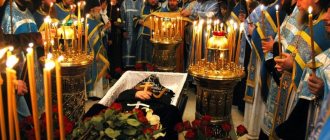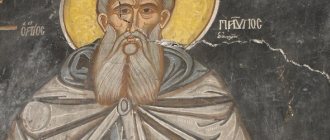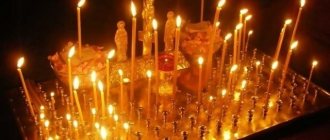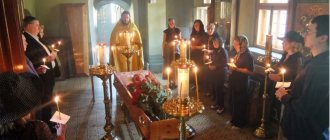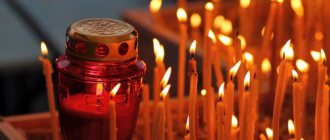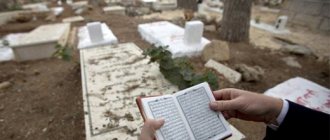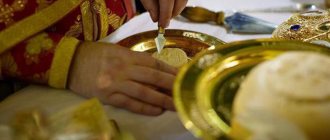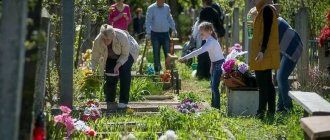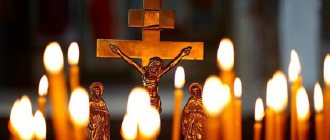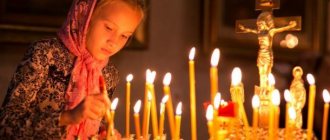Many people have questions about the advisability and correctness of visiting a cemetery on a holiday, Easter. On the one hand, the church does not talk about banning visiting the churchyard, on the other hand, many people consider visiting deceased relatives a tradition. The cemetery must be visited to express grief for loved ones who have left this world. It is considered to be a place of concentration of human wisdom. All religions respect the act of burial. Veneration of the dead and protection of burial sites is a common religious feature of all cultures.
When did the custom of going to the churchyard on Easter days arise?
The folk custom of visiting the graves of relatives at the cemetery on Easter, as historians and some priests answer, could have originated somewhat earlier than the revolution. At that time, graveyards were located next to churches or chapels, in large villages. Residents of small villages had to travel long distances on foot or take carts to come to the temple. On Easter, believers, having served the holiday service, could go in the morning and visit the graves of their relatives and friends before returning. Some began to break their fast there before the long journey home.
The Soviet tradition of visiting the graves of relatives in the cemetery on Easter arose after the revolution, when churches were closed, priests were subjected to repression, and believers could be kicked out of work, put in prison or a mental hospital. The only place where people could meet with fellow believers, greet them, and exchange cakes with impunity was the cemetery. The burial places of relatives were a kind of symbol of the protest of believers against the tyranny of atheists. The authorities did not interfere with such communication, since this was not an Orthodox tradition. Now that faith is no longer persecuted by law, you cannot go and remember the dead in the cemetery on Easter, there is no longer such a reason.
What to do on Radonitsa
Special memorial services are held on Radonitsa
The very name of the holiday “Radonitsa” does not mean grief and sadness, but joy. Believers rejoice that the dead have entered the kingdom of God. Their worldly worries and difficulties have ceased, and one day they will all be reunited in heaven. These thoughts should bring joy to believers.
On Radonitsa a special memorial service is celebrated, accompanied by Easter chants. Also, when visiting the cemetery on Radonitsa, they pray for the dead at the graves. Before going to the cemetery, Orthodox Christians visit the church, give notes, light a candle on the altar, and take communion.
A church candle is lit at the cemetery and prayers are read. If possible, it is better to invite a clergyman to Radonitsa, but you can read the prayer yourself. After this, it is necessary to put the graves of relatives in order: remove garbage, paint the fence, wipe the monument, etc. And then you should spend some time in silence, remembering all the happy moments when the person was still alive.
Unfortunately, there are still folk traditions that the church strongly condemns:
- Drinking alcoholic beverages on Radonitsa. In cemeteries during the holiday you can meet people having real drinking parties at the graves. The souls who have left us need prayer for salvation. They should know that they are not forgotten and are constantly remembered with a kind word and a bright thought, and drinking alcohol in a cemetery will only insult the memory of the dead.
- The Church is categorically against leaving illuminated Easter cakes and colored eggs on graves. Some even put a glass of vodka, covering it with a piece of bread. This should not be done under any circumstances.
- After visiting the Radonitsa cemetery, most people go home, where they have lavish feasts, forgetting the true meaning of this holiday.
Visiting a cemetery on Easter is equated by some to a terrible sin, but it is not, although the church does not approve of it. Still, the holiday of Holy Sunday is a day when you should have fun and not indulge in sadness. And you need to remember the departed on specially designated days.
Why you shouldn’t remember the dead on Easter
Easter is the main holiday of Christians around the world. On this day there is a triumph of life over death, a joy that should not be overshadowed by sorrow for those who are already with the Lord. It is inappropriate and wrong to bring this joy to a place of sadness, which is the churchyard, as well as to grieve on this Great Day, much less to clean up. On Easter week, they don’t work, there are no prayers for the dead in churches, there are no memorial services, and it’s not customary to hold funeral services. And if someone dies these days, a special funeral service is held, where Easter chants are sung. That is why Orthodox Christians do not go to the cemetery on Easter.
Parents' Saturdays
Great Lent does not provide for daily prayers for the repose. The Church determines several dates when general prayers will take place for the salvation of the souls of the dead before the Last Judgment. The Church does not forget about the departed, and every year before the Great Feast every person has the opportunity to remember the departed people in their prayers.
In 2022, parental Saturdays fall on the following dates:
- March, 3rd;
- 10th of March;
- March 17.
After Easter week, on the 10th day after Easter, Radonitsa is celebrated. In 2022, a general memorial service and cemetery visitation will take place on Tuesday, April 17th.
There are certain rules about what needs to be done on parenting Saturdays.
The cemetery is worth visiting on Parents' Saturday
On the memorial day, you should visit the church, light candles for the repose, and write the needs. It is advisable to distribute coins and food to those in need. Many people believe that visiting a cemetery on Parents' Saturday is mandatory. If possible, it is advisable to tidy up the graves and spend some time there. The Church welcomes the decoration of graves on memorial days.
It is strictly forbidden to drink alcohol in the cemetery or have a feast after visiting it. Memorial Saturday is a day when you should remember your departed loved ones with kind words and fond memories, and not by drinking alcohol, which often ends with songs and dances.
But you shouldn’t grieve too much in a cemetery either. Of course, the loss of loved ones is a very great grief, and over the years the pain, although dulled, does not disappear. But the Orthodox Church reminds that despondency is also a sin, so it is better to remember all the good things that were associated with the dead.
When to remember the dead
In Orthodoxy, there are services for special (pure) commemoration of deceased loved ones. Such days are Parental Saturdays, three of them are specifically intended for commemoration during the days of Lent. The day before, on Friday, a service is held, where the priest reads the 17th kathisma (funeral) from the Psalter, which requires a special canon. In the morning, a liturgy is served, at which the deceased are remembered, notes of repose are written (only baptized Orthodox Christians, not suicides), and sweets, bread, butter, and other products are brought to church in memory of deceased relatives. After the liturgy, they serve a memorial service, where there is an obligatory prayer for the repose of all infants, soldiers and all Orthodox Christians. And then they go to the cemetery and clean it up after the winter.
Easter treats and rules of consumption
Is it possible to eat Easter cake before Easter? If you strictly follow the rules of preparation for the Holy Resurrection of Christ, then you will probably observe fasting, especially during the last week before Easter. And Easter cakes are a rich pastry that contains large quantities of chicken eggs, butter, milk, and other ingredients of plant origin.
Let us remember that the strictest fast is observed on Good Friday. If you do not have any serious chronic illnesses and have your doctor's permission, you can try following this strict rule. During Holy Week they eat only plant foods without oil.
Breaking the fast, that is, the first small meal after the end of fasting, is celebrated after the Liturgy and communion. If you attended the Liturgy at night, after the night service you can begin the festive meal. The most important thing, especially if you observed Lent, is to eat in moderation.
As for the question of whether you can drink on Easter, you also need to follow the rule of moderation. If this trait is present in your character and you are able to treat yourself to various dishes and drinks, including alcoholic ones, in moderation, then there are no restrictions for drinking small amounts of wine or other alcoholic beverages. If you have not noticed such a trait in yourself, then it is better to avoid drinking alcohol and delight yourself exclusively with spiritual joy.
Go to the churchyard after Easter celebrations
If you are wondering whether people go to the cemetery on Easter Day, the answer is that it is better to do it after the end of Bright Week. On the Tuesday following it (on the ninth day), Radonitsa is celebrated. We need to find time to clean up the graves in advance, on Monday. Radonitsa is a holiday when the living share with the dead the joy and good news of the resurrection of the Lord. On this holiday it is necessary to visit the dead; believers recognize the fact that Christ conquered death. This holiday calls on Christians not to grieve over the death of their loved ones, but to rejoice at their birth for eternal life. On Radonitsa, it is customary to again perform a funeral commemoration, which was not held after Easter, to serve a memorial service, and to go to the cemetery. There you need to serve a funeral lithium (a special prayer rite) at the graves of your loved ones.
The next day when it is supposed to be remembered and you need to go to the cemetery is Trinity Ecumenical Parents' Saturday. It’s better to clean up on the eve of the holiday. This memorial tradition dates back to apostolic times, and precedes two great holidays - the Holy Trinity and Pentecost (Descent of the Holy Spirit). The Church at this time asks that the grace of the Holy Spirit descend not only on the living, but also on the dead.
The Church's attitude to fortune telling
Archpriest Andrei Efanov, in a commentary to the Thomas magazine, says that one should not resort to all kinds of fortune-telling not only on Easter, but also, in principle, on any other day. The insidiousness of this activity lies in the fact that the one who asks to tell fortunes receives a certain answer and programs himself for it.
“Firstly, this is disrespect for the Will of God. Secondly, this is a disregard for the freedom that the Lord has endowed each of us from birth. When we use even a comic, as it seems to us, fortune-telling, when we receive an answer, we program ourselves for certain actions. And the most interesting thing is that this happens unconsciously,” explains Andrey Efanov. Thus, the answer to the question of whether it is possible to tell fortunes on Easter is definitely negative.
PS And finally, the answer to an intimate question - is it possible to have sex on Easter. Most clergy agree that it is better to abstain from sex not only on Sunday, but throughout Holy Week. Temporary abstinence from sex should be a conscious and voluntary decision for both spouses.
Whatever activity you ask about on the Bright Resurrection of Christ, remember one main rule - you need to put God and your own spiritual growth first, then you will correctly prioritize in any area of your life.
How to behave when visiting a church (monastery) or graveyard
Often Orthodox believers strive not only to go to the cemetery, but also to remember their dead in various churches and visit monasteries. A believer can go to a monastery or its compound and make a memorial for loved ones in church at any time. You can order one mass for the deceased or as many as you want - commemoration by a clergyman during the liturgy, forty-day - commemoration for forty days. There are longer dates - six months, a year, and in some monasteries they also accept eternal remembrance.
Is it a sin to remember in cemeteries on holidays?
In the Holy Scriptures there is no direct prohibition on visiting the churchyard on holidays or Bright Week. If a person wants to go to the graves of relatives on Easter, then this is not a mortal sin. The position of the church is explained by the presence of certain rules, specially designated days for joy and sorrow. When Easter comes and people ask whether they can go to the cemetery, the clergy do not forbid, but strongly recommend that they refuse to remember relatives in cemeteries, and even more so, to clean the graves.
There are more and more believers every year. For an Orthodox person, fulfilling the rules of celebration has great spiritual significance. Therefore, churchgoers refuse to go to the churchyard on holidays, preferring to pray for their loved ones at a certain memorial time.
Work on the Bright Resurrection of Christ and Week
Is it possible to clean on the Friday before Easter? There is no direct ban on housework or work related to professional activities on these days and throughout Bright Week. But in this regard, you need to remember several points at once, explains Archpriest Igor Fomin on the website of the Thomas magazine.
Those who have the opportunity to take a vacation during the entire Bright Week should certainly use it and devote this time to God, learn better about church traditions, and visit church on the prescribed days. If this is not possible, then even while doing your usual work, try to do it as well as possible and dedicating it to God. This will be your feasible contribution to your own spiritual development.
Is it possible to work on Easter? This means precisely on the day of the Holy Resurrection of Christ. Work is a purely individual matter. Traditionally, in preparation for the holiday, the house is thoroughly cleaned, clothes are washed, and in the last days before Easter they prepare Easter cakes and other Easter treats. Therefore, spending so much precious time during the holiday on performing routine household chores is simply unreasonable.
This leads to the answer to the question of whether it is possible to knit for Easter. It is quite possible to find another day for knitting, sewing and other hobbies or main activities. The corresponding answer to the question is whether it is possible to work on the land on Easter. During one of the main Orthodox holidays, it is better to devote time to communication on spiritual topics, meetings with like-minded people and visits to church during the Liturgy.
And finally, one more question related to work - is it possible to fish on Easter? Obviously, if you are not a fisherman by profession and are not forced to perform your regular duties at sea, then it is better to refuse this activity on the Bright Resurrection of Christ. The ban on work on Easter is not canonical, it is rather a pious tradition.


